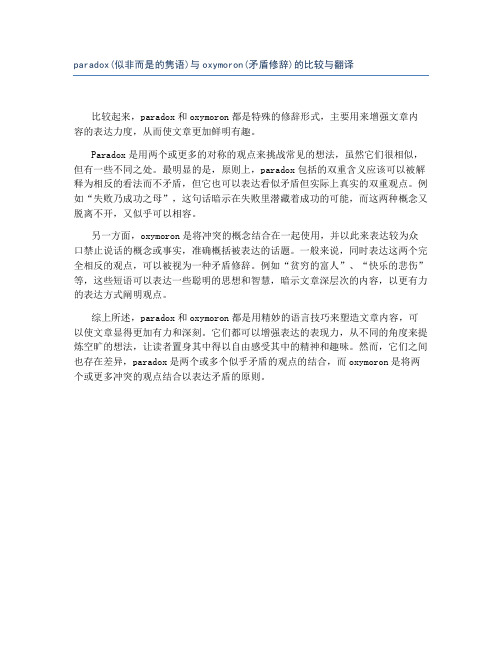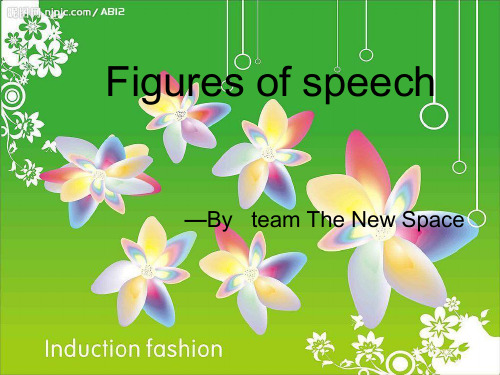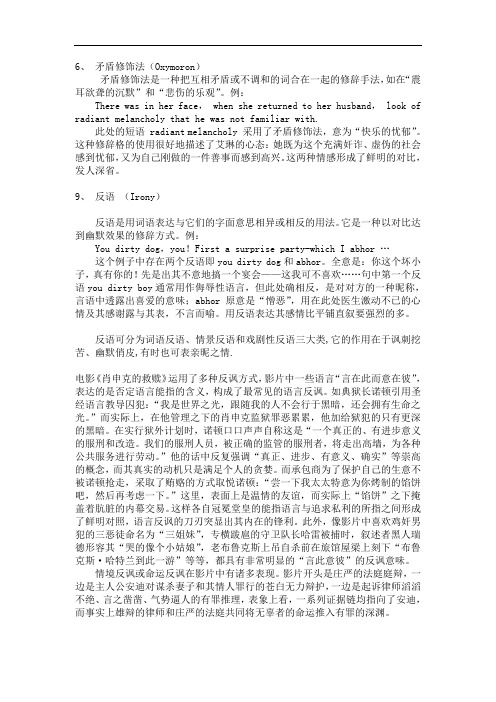Paradox 隽语
Paradox

• Homeless,they have a hundred homes. ----(O Henry: The Furnished Room) • 他们无家可归,便可以处处为家。
• I love him so much that I hate him when he looks at another girl. • 我如此爱他,以至他瞟看其他姑娘,我便会 恨他。
◆我迟早要成名的,没有美名也有恶名在外。 ◆自恋是一个人一生浪漫的开端。 ◆邪恶与美德是艺术家艺术创作的素材。 ◆我花了一个上午的时间去掉一个逗号,到了下午的时候 我又把它放了回去。 ◆生活中有两个悲剧:一个是得不到想要的,另一个是得 到了不想要的。
◆生活模仿艺术,而非艺术在反映生活。
◆如今是这样的时代,看得太多而没有时间欣赏,写得太 多而没有时间思想。
• 按常理,一个能使人发出阵阵笑声的人自己也应该是非常 幸福的,其实不然,马克吐温(Mark Twain)的一生都笼 罩在悲剧的阴影之中,自己的亲人在短短的几年里相继去 世,饱尝了人世的辛酸。在他晚年时期,他变得愤世嫉俗, 写了大量辛酸尖刻的文章,挖苦小人,抨击时弊,赢得世 人的阵阵笑声,但却对当局者嫉恶如仇。
More examples:
☺Lifeless, faultless.(只有死人才不犯错误。) ☺Knowing something of everything and everything of something.(通百艺而专一 长。)
☺From small beginning comes great things.(伟大始于渺小。) ☺Diamond cuts diamond.(强中自有强中手。)
隽语的运用使那些富有人生哲理的警句、格言、谚 语更加生动活泼,言简意赅,给人们留下更深刻的 印象。 For example:
paradox(似非而是的隽语)与oxymoron(矛盾修辞)的比较与翻译

paradox(似非而是的隽语)与oxymoron(矛盾修辞)的比较与翻译
比较起来,paradox和oxymoron都是特殊的修辞形式,主要用来增强文章内容的表达力度,从而使文章更加鲜明有趣。
Paradox是用两个或更多的对称的观点来挑战常见的想法,虽然它们很相似,但有一些不同之处。
最明显的是,原则上,paradox包括的双重含义应该可以被解释为相反的看法而不矛盾,但它也可以表达看似矛盾但实际上真实的双重观点。
例如“失败乃成功之母”,这句话暗示在失败里潜藏着成功的可能,而这两种概念又脱离不开,又似乎可以相容。
另一方面,oxymoron是将冲突的概念结合在一起使用,并以此来表达较为众口禁止说话的概念或事实,准确概括被表达的话题。
一般来说,同时表达这两个完全相反的观点,可以被视为一种矛盾修辞。
例如“贫穷的富人”、“快乐的悲伤”等,这些短语可以表达一些聪明的思想和智慧,暗示文章深层次的内容,以更有力的表达方式阐明观点。
综上所述,paradox和oxymoron都是用精妙的语言技巧来塑造文章内容,可以使文章显得更加有力和深刻。
它们都可以增强表达的表现力,从不同的角度来提炼空旷的想法,让读者置身其中得以自由感受其中的精神和趣味。
然而,它们之间也存在差异,paradox是两个或多个似乎矛盾的观点的结合,而oxymoron是将两个或更多冲突的观点结合以表达矛盾的原则。
Epigram paradox 23 24

paradoxparadox也有隽语的意思,但是指“似是而非的隽语”这是一种貌似矛盾但包含一定哲理的意味深长的说法隽语是一种语体,短小机智的妙语、警句和名言都算做隽语。
似是而非的隽语是一个言论自由的声明或命题于表面看来似乎是自相矛盾的,荒谬的,或者违反既定事实或做法,但在进一步的思考和研究,可能被证明是真的,理由充分,并组成的数字甚至包含一个简洁点。
似是而非的隽语:欲速则不达悖论,指事物自相矛盾。
It is a paradox that such a rich country should have so many poor people living in it.如此富足的国家竟有如此多的穷人, 这是个矛盾的现实。
These are the times of fast food and slow digestion; tall men and short character; steep profits and shallow relationships. More leisure and less fun; more kinds of food, but less nutrition; two incomes, but more divorce; fancier houses, but broken homes.Today, we have bigger house and smaller families, more convenience, but less time.We have more degrees, but less common sense, more knowledge, but less judgment.We have more experts, but more problem, more medicine, but less wellness.We drive too fastGet to angry more quicklyWe increase our possessions, but reduce our values.We talk too much, love too little, and lie too often.Grasp all, lose all.贪多必失。
paradox

Contrast Between Oxymoron and Paradox
矛盾修辞法
• An Oxymoron is a compressed paradox, formed by the conjoining of two contrasting, contradictory terms. • 矛盾修辞是把一对语意相反、相对立的词
• 悖论是一种似乎自相矛盾的说法。它通常有两个
平行的元素,貌似合乎逻辑的矛盾,但一定包含 了一个道理。
Some simple examples
• The more you give,the more you have. (你付出的越多,你拥有的越多。) • A friend to everybody is a friend to nobody. (友多无好友) • More haste, less speed. (欲速则不达) • War is peace. Freedom is slavery. Ignorance is strength.( 战争就是和平, 自由就是奴役,无知就是力量)
Paradox
——
悖• A paradox is a statement,which is apparently self-contradictory.It usually has two parallel elements that appear to be logically contradictory and yet contain a truth.
The End…
众人事,无人管。(三个和尚没水喝。)
• 从以上paradox 的例证, 不难看出所谓paradox 就是一句话中运用相互矛盾或意思正好相反的词 语来体现其看似不可信, 甚至荒谬的特点。例如 more 与less , child 与father , believed 与 unbelievable , healthy 与sick , knowledge 与 ignorance , hate 与love 等等, 而这正是 Oxymoron的本质所在。 • 由此,我们可以得出结论: • Oxymoron 与paradox 不仅仅是异曲同工, 简直 就是同曲同工。以上所有描述足以说明: Oxymoron 是浓缩了的paradox 。
双关暗讽隽语

Different kinds2
2)Spoil yourself and not your figure.(Weight-Watcher冰 淇淋广告) 。“Spoil Yourself” 意为“满足尽兴”,而“spoil one’s figure” 意为“毁伤了体型” 3 语法双关(由于语法方面的问题产生的双关,如省略结构、 某词或词组具有两种以上语法功能等) Coke refreshes you like no other can. can既可理解为名词罐”,又可看成是情态动词“能”,全 句可理Coke refreshes you like no other can can refresh you 4成语或俗语双关 A Mars a day keeps you work, rest and play.
Innuendo (暗讽)
• It is a mild form of irony, hinting in a rather roundabout (曲折)way at something disparaging(不一致) or uncomplimentary(不赞美) to the person or subject mentioned.
• oxymoron矛盾修辞法:是将两个互相矛盾,互不 调和的词放在同一个短语中,产生特殊的深刻含 义的一种修辞手段。 • e.g., a clever fool聪明的傻瓜true lies真实的谎言 • paradox悖论,指事物自相矛盾。 • e.g., It is a paradox that such a rich country should have so many poor people living in it.如 此富足的国家竟有如此多的穷人, 这是个矛盾的现 实.
Paradox

The Child is father of the Man.
—— William Wordsworth
婴儿是成人的父亲。
在文章标题和广告中的应用
• John McEnroe: the Champ You love to Hate
约翰.麦肯罗:你既喜欢又不喜欢的冠军
• 反论/隽语是把两个相反的概念组合在一个句子中。 这两个相反的概念表面上自相矛盾,不合常理, 实际上寓意深刻,颇有道理。
Examples
This suspense is terrible. I hope it will last. • 这种悬念实在是让人受不了,我希望它能继 续下去。
The more you give ,the more you have. • 给的越多,得到的越多。
• No news is good news.
• 没有消息就是好消息。
• A friend to everybody is a friend to nobody. • 滥交者无友。
Everybody’s business is nobody’s business.
人人有责,无人负责。 (=Unless is known to who is responsible for each particular duty, everyone will neglect it, believing that someone is doing it.) What may be done at any time will be done at no time. 随时能办的事,往往办不成。 (= One who fails to set a time for accomplishment may never get to it.)
词汇学paradoxoxymoronirony举例2

6、矛盾修饰法(Oxymoron)矛盾修饰法是一种把互相矛盾或不调和的词合在一起的修辞手法,如在“震耳欲聋的沉默”和“悲伤的乐观”。
例:There was in her face, when she returned to her husband, look of radiant melancholy that he was not familiar with.此处的短语 radiant melancholy 采用了矛盾修饰法,意为“快乐的忧郁”。
这种修辞格的使用很好地描述了艾琳的心态:她既为这个充满奸诈、虚伪的社会感到忧郁,又为自己刚做的一件善事而感到高兴。
这两种情感形成了鲜明的对比,发人深省。
9、反语(Irony)反语是用词语表达与它们的字面意思相异或相反的用法。
它是一种以对比达到幽默效果的修辞方式。
例:You dirty dog,you!First a surprise party-which I abhor …这个例子中存在两个反语即you dirty dog和abhor。
全意是:你这个坏小子,真有你的!先是出其不意地搞一个宴会——这我可不喜欢……句中第一个反语you dirty boy通常用作侮辱性语言,但此处确相反,是对对方的一种昵称,言语中透露出喜爱的意味;abhor原意是“憎恶”,用在此处医生激动不已的心情及其感谢露与其表,不言而喻。
用反语表达其感情比平铺直叙要强烈的多。
反语可分为词语反语、情景反语和戏剧性反语三大类,它的作用在于讽刺挖苦、幽默俏皮,有时也可表亲昵之情.电影《肖申克的救赎》运用了多种反讽方式,影片中一些语言“言在此而意在彼”,表达的是否定语言能指的含义,构成了最常见的语言反讽。
如典狱长诺顿引用圣经语言教导囚犯:“我是世界之光,跟随我的人不会行于黑暗,还会拥有生命之光。
”而实际上,在他管理之下的肖申克监狱罪恶累累,他加给狱犯的只有更深的黑暗。
在实行狱外计划时,诺顿口口声声自称这是“一个真正的、有进步意义的服刑和改造。
英语修辞Antithesis,22Paradox,and23 Oxymoron

1) adj. + noun
1) adj. + noun
• • • • (14) busy idleness (15) painful pleasure (16) careful carelessness (17) successful failure
1) adj. + noun
• • • • • (18) thunderous silence (19) sweet suffering (20) public secret (21) friendly hostility (22) cold politeness
Examples
• 5) The water that bears the boat is the same that swallows it up. • (Water can be used to serve people, but it can also be a disaster.)
Examples
(6) a living death ----活着的死人 (7) conspicuous absence ---显而易见的缺勤 (8) tearful joy ---含泪的喜悦 (9) jarring concord ----不和谐的一致
1) adj. + noun
• • • • • • • •
(10) Healthy junk foods ---健康垃圾食物 (11) Disciplined mob ----训练有素的暴民 (12) Intimate enemies ---情密的敌人 (13) a victorious defeat ----胜利的失败
A Tale of Two Cities
metaphor, antithesis
- 1、下载文档前请自行甄别文档内容的完整性,平台不提供额外的编辑、内容补充、找答案等附加服务。
- 2、"仅部分预览"的文档,不可在线预览部分如存在完整性等问题,可反馈申请退款(可完整预览的文档不适用该条件!)。
- 3、如文档侵犯您的权益,请联系客服反馈,我们会尽快为您处理(人工客服工作时间:9:00-18:30)。
的, 还在贪婪地喝着不知其味的酒。 ※ Paradox与oxymoron之异同: 1) 相同之处 故意使用相互对立的反义词语,形成自 相矛盾的表层语意,以此来表达富有哲理 性的内容,抒发强烈的、深层或含蓄的感 情,获得新奇的艺术效果。 2) 相异之处 Oxymoron把意义相互对立的概念组合
在短语中,它是短语层次上的修辞格,而 paradox是把意义相互对立的概念巧妙地组 合在句子中,它是句子层次上的修辞格。 在oxymoron中,意义相悖的两个词语之 间存在着修饰与被修饰关系,或者说明与 被说明的关系;而在paradox中,不存在这 种修饰或说明关系。 总之,paradox是expanded oxymoron(扩
a) In fact, it appears that the teachers of English teach English so poorly because they teach grammar so well. 实际上,看来英语教师们 教得差,很大程度上是由于他们语法上教 得太好。 b) He who praises everybody praises nobody. c) They all got drunk, but they laughed and shouted still drinking greedily of the drinks they could not taste. 他们都醉了,又喊又叫
I. Pபைடு நூலகம்radox: 隽语,悖论,反论 1. Definition: Paradox is a figure of speech consisting of a statement or proposition which on the face it seems self-contradictory, absurd or contrary to established fact or practice, but which on further thinking and study may prove to be true, well-founded, and even
listening, by observing how it is actually used in speech or writing. 3. General words and specific words If a word is called general, it refers to a group of a class. Good writing or speaking has both general and specific information. Abstract and general expressions “tell”, while concrete and specific
to contain a succinct(简明的) point. In brief, it is the use of apparently contradictory ideas to point out some underlying truth. 隽语,是 一种修辞格,其“陈述或题旨虽显得荒谬、 自相矛盾,但却是真理”。隽语貌似荒诞, 却哲理隽永,实含智慧。语句表达常为警 世之言,既有说话人的机智、聪慧,又突 显说话人的洞察力和智谋。
II. Choice of words: 1. The significance: Choose the right words to communicate our ideas precisely and effectively. a) Read three examples on page 51, and try to understand why the three italicized words are not suitable to the examples respectively. 2. Try to tell the unsuitable word or words which are used in the following:
specific expressions “show”. But concrete and specific words are not always “better” than abstract and general words. 4. Short words and long words Read what has related on p. 61
第十二周课件
Contents: I. Paradox II. Choice of Words ( p.p. 51-62) 1. Use suitable words 2. Denotation 3. Connotation 4. General words and specific words 5. Short words and long words
a) This visit has remained a deep impression in his heart. b) The slave owner cried at his slaves in indignation. c) Three days ago, some Philippine marine policemen’s intrusion into China’s territorial waters and their arresting our fishermen has risen the nation-widely indignation.
大的矛盾修饰法),而 oxymoron 是 condensed paradox(浓缩的隽语或悖论) a) Then suddenly fame turned into shame. ( paradox。因为fame和shame只是对比关系, 非相互修饰关系) b) He is a damned saint, an honorable villain. (oxymoron。因为damned修饰saint,而且彼此 在意义上是矛盾的。同样,honorable修饰 villain,彼此在意义上也是矛盾的。)
Try to tell which of the following is a paradox. a) He was conspicuously absent at the party. b) There was an audible stillness, in which the common voice sounded strange. c) Love is a sweet tyranny, because the lover endures his torment willingly. d) He has got the handcuffs, and she can have the medal.
2. Denotation and Connotation: 1) Denotation is the specific, direct, and literal meaning of a word. 字面意义 2) Connotation is the associative or suggestive meaning of a word. 内涵,隐含意 思 We can find the denotation of a word in a dictionary but we can acquire connotation only through extensive reading and attentive
d) As students of English, we must master English very well. e) I had been finding out my dictionary before he came. f) Finishing reading the book, I was too excited to go to bed. g) Three years have passed, we have learned a lot of knowledge of English.
